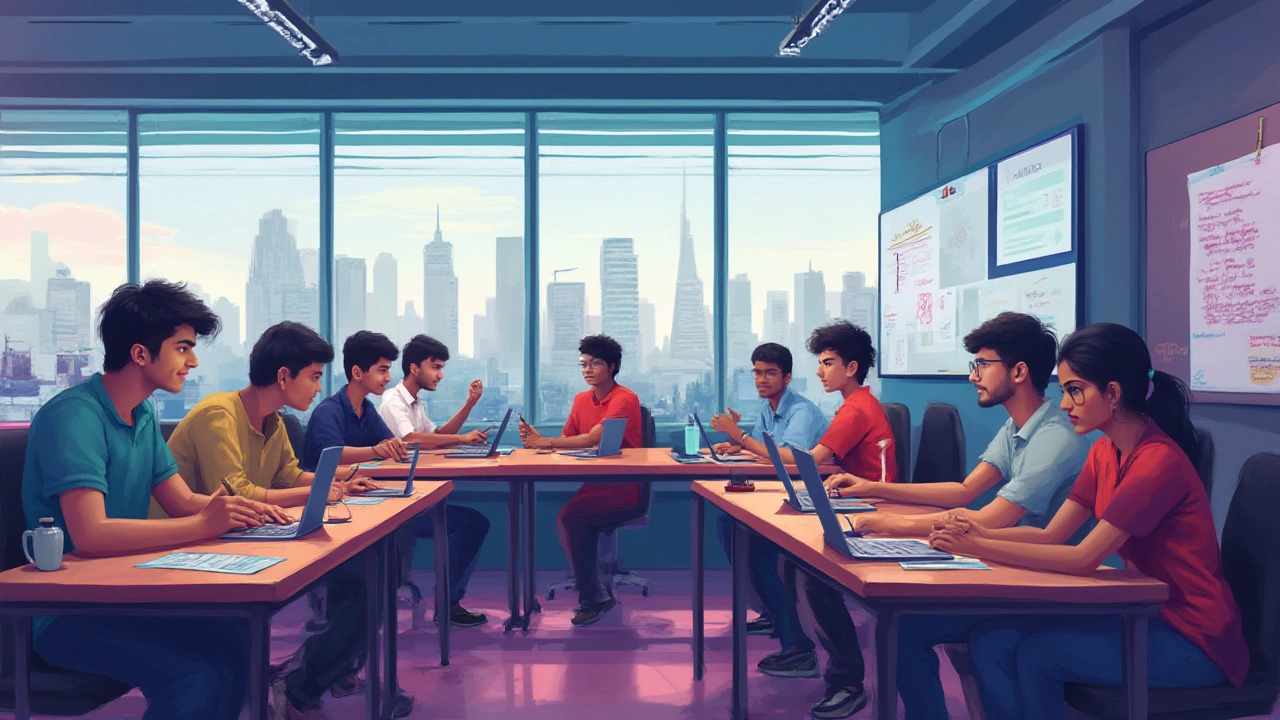
Lots of people use the words “programming” and “coding” like they mean the exact same thing. The truth is, they’re not identical twins. While you can’t have one without the other if you want working software, there’s a gap between typing out simple code and building applications that run your bank, your favorite apps, or even the city’s traffic lights. Some tech leaders swear there's a big difference; others insist the lines are blurry. But if you’re thinking about learning or jumping into a tech job, you really want to know what sets them apart—which is not just a question of semantics. Here’s the lowdown: coding is only one piece of the puzzle. Programming is the whole process of breathing life into a product that actually solves a problem.
The Core Difference: What Sets Programming Apart From Coding?
So, let’s clear the fog. Coding is basically translating instructions into a language a computer understands. Think of it like writing down instructions to assemble IKEA furniture, but in a way only the computer gets. You grab a programming language—C++, Python, JavaScript, whatever—and type commands that will be run line by line. Anyone who’s spent an afternoon poking at HTML or tinkering with a tiny Python script to add two numbers—that’s coding. You’re telling the computer exactly what to do, a little bit at a time.
Programming, on the other hand, is the full art and science of designing a solution from scratch. It covers problem solving, logic, algorithms, structure, testing, and maintenance. When you program, you’re building the architecture. You’re figuring out things like: “What is the problem? How can I break it into steps? Which language is best? How will I test it?” You could say that all programmers are coders, but not all coders are programmers. To put it simply, coding is about writing code. Programming is about building the system behind it.
Here’s an analogy: imagine a band. Coding is learning to play guitar chords. Programming is composing the whole song, arranging all the instruments, and figuring out how they work together. That’s why top programmers might spend hours drawing when other people just want to start coding. You plan before typing. A 2023 Stack Overflow survey showed over 70% of experienced developers spend more time thinking about the problem and planning the architecture than writing actual code. That’s not just more efficient; it saves insane amounts of time fixing things later.
Coding rarely requires much context outside what’s asked: “Make this button turn blue.” Programming means weighing tradeoffs (“Is blue the right color for accessibility? What platform are we targeting? How does this fit in with the backend?”). It’s a higher level view.
| Aspect | Coding | Programming |
|---|---|---|
| Definition | Translating logic into syntax | Designing and creating entire logical solutions |
| Focus | Syntax of a specific language | Problem-solving, analysis, and design |
| Skills Needed | Language knowledge | Algorithmic thinking, architecture, testing |
| Tools Used | Code editors, IDEs | UML tools, debuggers, project management |
| Scope | Single functions, small scripts | Complete applications, systems |
Knowing this difference actually changes how people learn and get hired. Plenty of bootcamps and schools focus first on coding, since you need that foundation. But real-world jobs—at Google, Microsoft, or startups—ask for deeper programming skills. The pay jump is massive: as of July 2025, the average entry-level coder in the US makes around $55,000 a year, while someone with strong programming and app architecture chops easily clears $100,000 and up, especially in big tech hubs.
All this isn’t to say coding is “easy” and programming is “hard”—they’re both challenging in different ways. But, if you’re learning, knowing the distinction means you can set better goals. Don’t just memorize syntax. Try to understand why a program is built the way it is. That’s what makes a programmer stand out.

Diving Deeper: Key Skills, Real-World Examples, and Misconceptions
Ask five developers to explain what makes a coder versus a programmer and you’ll get at least a half-dozen heated opinions. Some insist it’s all semantics; others swear it’s obvious. But let’s break down the skills and roles to see what’s actually different.
A coder’s main job is writing lines of code so the computer obeys. They might take predefined specs, grab functions, and put them together. Ever written a website using HTML and CSS based on a template? That’s classic coding. You’re not making new frameworks or inventing new features; you’re putting existing pieces in order using syntax. Good coders memorize shortcuts, know their way around IDEs (Integrated Development Environments), and can debug small errors quickly. They often follow patterns or existing instructions and workflows.
But real programming goes further. Programmers tackle problems that sometimes don’t even have a clear solution yet. Imagine you’re building an app that can recommend music based on your mood. There’s no instruction manual for that. Programmers use algorithmic thinking: breaking big problems into smaller chunks, spotting patterns, and designing step-by-step solutions. They create flowcharts, pseudocode, and sometimes sit down with a pencil before they ever touch the keyboard.
Here’s a handy tip for beginners: before coding, try describing the problem out loud or on paper. If you get stuck, you likely need to step back and plan. This mirrors what top programmers actually do on the job, rather than just pounding out lines of code.
The projects are different too. Coders might work on a small feature—coloring a widget, scripting a simple bot, or automating data entry. Programmers can lead teams, design the whole backend of an app, or oversee projects from idea to launch. That’s why Google’s famous hiring interviews focus less on if you can code in a specific language—and more on how you think, solve problems, and break down complex challenges.
Let’s talk about tools. Coders usually stick to text editors, and maybe some version control like Git. But programmers might use diagramming tools, code profilers, test frameworks, and even project management software to keep the whole project on track. Here’s a weird fact for you: many pro app developers don’t code all day. A 2024 survey by GitHub claimed that about 35% of a senior developer’s time is spent in meetings, planning, or reviewing code—not writing it.
Common misconception alert: some people think “coding” sounds cooler than “programming” because it’s newer. In reality, coding is older—in the 1960s, “coding” was associated with early data entry, not creative tech jobs. Now, thanks to pop culture and cool startups, both terms get thrown around, but the core difference sticks: coding is putting instructions into a computer. Programming is creating the system those instructions live in.
Both roles are essential, but tech companies increasingly want people who do more than just code. They want problem solvers. So if you’re starting out and want to impress: learn to code, but also practice breaking big projects into smaller parts, think through edge cases, and read up on how large-scale software is actually built.
- Debugging is key: A heads-up, even great code often fails at first. Both coders and programmers need rock-solid patience and attention to detail.
- Reading other people’s code is just as important as writing your own. Open-source platforms like GitHub are great places to practice.
- You don’t need to know every language. Many top programmers only master one or two, but really get how to solve problems with them.
- Testing is not optional. Real programming involves setting up automated tests to catch bugs before they cause disasters (think: your bank app miscalculating balances—that’s happened more than once!).
- Soft skills matter: Communication, teamwork, and adaptability matter as much as technical knowledge, especially as you move into more programming-heavy roles.
If you’re serious about a tech career, don’t stop at “Hello World.” Tackle small projects end-to-end, mess with real frameworks, read case studies, and learn how applications are built, tested, and actually shipped.

Which One Should You Learn First—and Why Does the Difference Matter?
If you’re just starting out, all this can sound a little overwhelming. Do you need to master programming right away, or is it fine to start coding and level up over time? Well, everyone’s path is different, but there are a few things to think about.
Coding is easier to jump into. There are millions of free tutorials, YouTube channels, and online code playgrounds like Codecademy or freeCodeCamp where you can start coding today. Many people build early confidence by making small apps, games, or websites. That’s valuable. You learn syntax, fix errors, and get how logic works.
But if your goal is to build stuff that’s actually useful—or land the more interesting or higher-paying jobs—you’ll want to start thinking like a programmer much sooner. That means learning:
- How to break down a problem into steps before touching the code.
- Why certain languages or frameworks are best for specific jobs (Python for analysis, Java for enterprises, JavaScript for the web, etc).
- How software projects are really built in teams—using things like repositories, branches, and pull requests.
- Building, testing, and maintaining (not just launching) real projects.
Let’s get practical. Here’s a quick list of starter projects for coding:
- Make a calculator in Python.
- Create a static website with HTML/CSS.
- Build a to-do list with JavaScript.
And here’s what a programming project might look like:
- Plan and build a budget-tracking app, from sketching the features to choosing how it manages data—and how it scales to handle thousands of users.
- Design a video game, including storyboarding events, coding physics, and planning how to save user scores.
- Create an encryption tool, figure out which algorithm is secure, and write up documentation for others to use it safely.
Remember, the market rewards programming skills. An IBM report from 2025 reveals that only about 22% of tech job listings focus entirely on coding. The rest—especially in competitive roles—want problem-solving. Even freelancers charge 60% more on average for projects that require architecture and testing, not just raw code.
But don’t stress. You don’t have to choose a side right away. The best software builders out there started with simple “hello world” coding, got stuck, learned to debug, and slowly leveled up to bigger projects. They asked questions, read books, browsed Stack Overflow, and got their hands dirty with real-world problems.
Want a tip? Find a project that excites you—not just copying tutorials but building something you actually care about. You’ll learn coding as you go, but pretty soon, you’ll need to think like a programmer: “How should this work? What’s the best way to solve this?” That transition is what tech hiring managers look for.
So whether you’re learning for fun or dreaming of your first software job, start with coding, but aim for programming-level thinking as soon as you can. That extra mile will open way more doors—and make building things way more fun.
